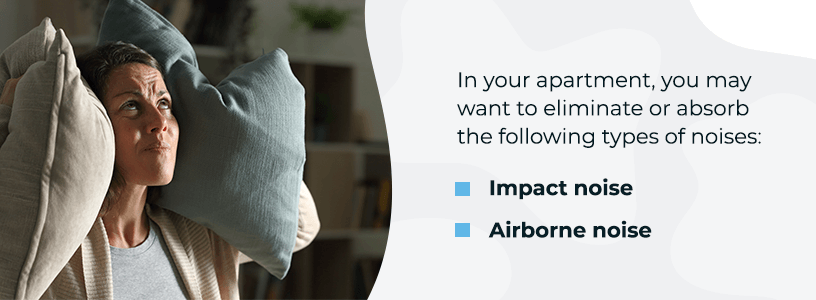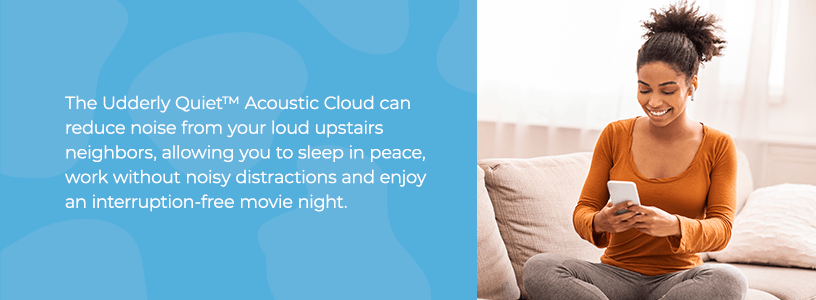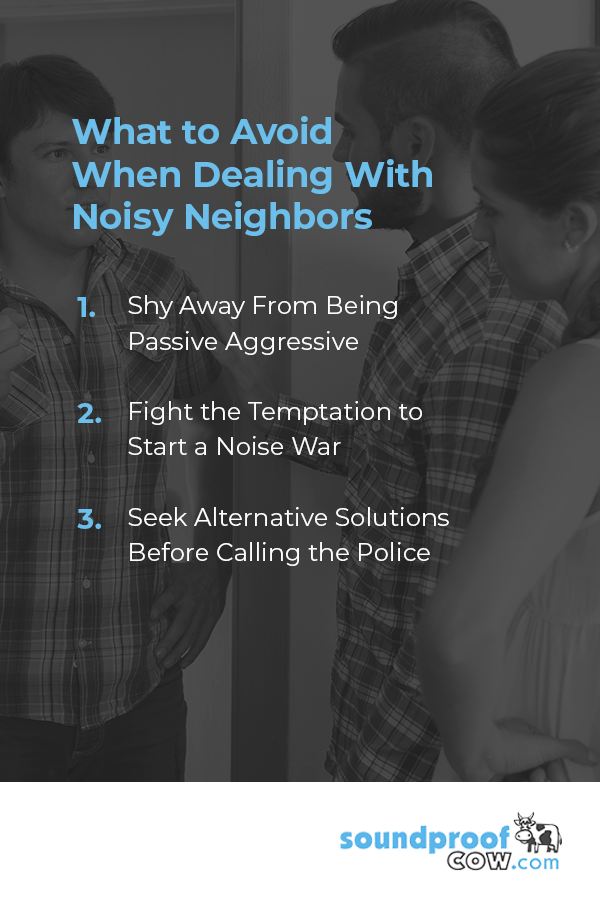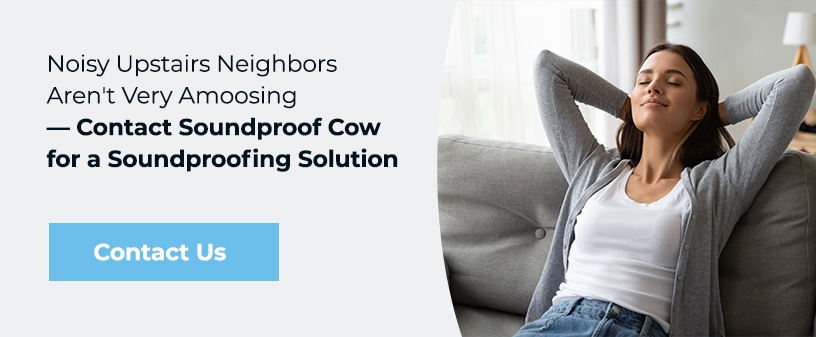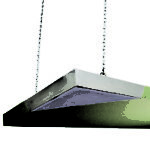
Many of our clients approach us with the problem of noisy upstairs neighbors. If you have the same problem, you may be familiar with the burning desire to grab your broom and jab it at the ceiling to return the noisy disruptions.
We don’t recommend starting a noise war, but we can recommend other Soundproof Cow-approved methods to reduce or eliminate noisy disruptions. Here, we’ll outline the do’s and don’ts of reducing the noise from your upstairs neighbors, as well as the best tools to soundproof your apartment ceiling.
Why Your Upstairs Neighbors Sound So Loud
Before we dive into soundproofing your apartment, it’s helpful to have a relative understanding of how sound works. This knowledge can help you determine the best strategy for tackling the noise from your loud upstairs neighbors.
Definition of Sound
Sounds are vibrations that travel in waves through a medium — like solids, water and gases. As an example, clap your hands. The contact of your hands creates a vibration. This vibration ripples through the air around you, similar to the ripples you’d see when you drop a rock into water. The sound vibration, or sound wave, bounces off your walls, ceiling and floor, which causes the sound wave to bounce back to your ears as a magnified sound.
When you hear your upstairs neighbors, the sound waves they create are traveling through their floorboards. These sound waves echo in the hollow space between their floor and your ceiling and in any connecting pipes. It then “leaks” into your apartment.
How to Reduce Noise from Upstairs
You can reduce the noise you hear from your upstairs neighbors using a few methods. If your neighbors are loud enough and management approves, we recommend minimally intrusive soundproofing measures, which we’ll outline later in this post.
In your apartment, you may want to eliminate or absorb the following types of noises:
- Impact noise: If you hear your neighbor walking to their kitchen, doing a vigorous workout or spontaneously rearranging their apartment furniture in the middle of the night, you’re hearing impact noise. Impact noise starts when something physically comes in contact with your upstairs neighbor’s floor. Then, that sound vibration travels through the floorboards and past your ceiling, resulting in noise.
- Airborne noise: Comparatively, if you hear their dishes clink, the sound of the workout program on their TV or the music they listen to as they redecorate, that’s airborne noise. Airborne noises aren’t directly in contact with your upstairs neighbor’s floorboards, but they are still loud enough to travel through their floor and past your ceiling, also resulting in noise.
Both types of sounds are irritating and can have a negative impact on your health and sanity. Luckily, you can help reduce the noise from your upstairs neighbors by capturing these impact and airborne noises and limiting the number of sound waves that enter your apartment.
View this post on Instagram
6 Tips on How to Reduce Noise From Upstairs Noisy Neighbors
Depending on the noise levels you’re experiencing, there is a range of sound-mitigating measures you can try. Options begin with attempting to cover up the noise and escalate to DIY soundproofing measures. Consider the following tips when battling the noise from your loud upstairs neighbors:
1. Use White Noise for Sound Isolation
Expanding on our earlier sound lesson, every sound has a frequency. White noise generates multiple frequencies at once, blanketing your ears with a calming sound. With white noise, every sound frequency has an equal amount of energy distribution. This helps to block out other sound waves, like the intrusive sounds from your upstairs neighbors.
In addition to blocking out unwanted sound, listening to white noise comes with other benefits, such as:
- Providing better, longer sleep patterns
- Aiding meditation
- Boosting concentration
White noise is growing in popularity. It is often used in the workplace to eliminate background work chatter or by mothers while putting their babies to sleep. For optimal sound coverage, we recommend setting up white noise solutions throughout your apartment. White noise solutions you may already own that you could consider using in your apartment include:
- Air conditioners
- Fans
- White noise machines
- White noise streaming services
For the best results, you may want to purchase a white noise machine, which you can find through a quick inquiry on your preferred search engine. That way, you can travel around your apartment and position the noise generator as needed instead of relying on headphones or immobile speakers.
2. Talk to Your Neighbors
If the noise from your upstairs neighbors still bothers you, you may want to try talking to them. There’s a good chance they don’t realize how much noise they’re producing, and most people will try to limit their noise if you bring it to their attention. Stay mindful, however, that they likely can’t eliminate their noise completely, as daily routines are bound to produce some level of noise.
We don’t recommend approaching your noisy upstairs neighbor while you’re upset. Instead, consider calmly talking to them about the situation in one of the following ways:
- Talk to them in person: Kindly explain the situation and work to come to a mutual and reasonable solution for quieting the noise transfer.
- Write them a letter: Letters are useful because they allow you to completely and appropriately lay out your thoughts. Plus, you can keep a copy of the letter in case you need to reach out to management later.
In both instances, keep your speech short, either with a five-minute conversation or a succinct letter. It may be hard to predict how your neighbors will react to your noise complaint, so avoid any passive-aggressive language, and calmly walk away from the situation if they become aggressive.
3. Use Sealant for Room Soundproofing
If white noise and remediation measures don’t work, it may be time to break out the DIY soundproofing equipment. Take a look at the space where your ceiling meets your wall, then at the spaces around your light fixtures. As we mentioned, sound waves from impact and airborne noises bounce in the hollow space between your ceiling and your upstairs neighbor’s floor. These sound waves escape through the ceiling and wall connections and light fixture gaps, letting sound into your apartment.
To remedy this noise transfer, we recommend using our OSI® Pro-Series SC-175 Acoustical Sound Sealant product. Before starting, you’ll likely want to check your lease and ask your landlord for permission to install this permanent sealant. Once approved, you can apply the acoustical sound sealant by following these steps:
- Take a damp cloth and thoroughly wipe away any surface-level dust and debris. Doing this creates a smooth, clean surface for the sealant to adhere to, further limiting the microscopic spaces where sound waves can escape.
- Using the convenient application tube, apply the sealant in an even layer along any spaces in your ceiling you identified earlier.
- Take another clean, damp cloth and apply a conservative amount of soap. Wipe away excess sealant.
Let the sealant dry and cure for two to seven days before determining if you need to advance to the next soundproofing strategy.
Shop Ceiling Soundproofing Materials
4. Soundproof the Ceiling
Ideally, soundproofing should start at the height of the noise transfer, in the space between your upstairs neighbor’s floor and your ceiling. But, your landlord likely won’t let you tear down the ceiling for a more permanent soundproofing tool, like soundproofing insulation. That’s why we created our Soundproof Cow-exclusive, the Udderly Quiet® Acoustic Cloud ceiling panel.
Our hanging acoustic panel is a new addition to our Udderly Quiet® product family, consisting of soundproofing characteristics like:
- A dense fiberglass core, built to absorb sound waves.
- An aluminum frame, designed to increase durability and integrity.
- A custom fabric cover to fit your apartment’s aesthetic.
The Udderly Quiet® Acoustic Cloud can be custom-made to fit your apartment’s specifications. It’s also duo-action, preventing sound waves from leaking through your ceiling and absorbing any vibrations that manage to pass through.
Plus, the hanging acoustic panel is lightweight and easy to install in any room of your apartment. The Udderly Quiet® Acoustic Cloud can reduce noise from your loud upstairs neighbors, allowing you to sleep in peace, work without noisy distractions and enjoy an interruption-free movie night.
Shop Udderly Quiet® Acoustic Clouds
5. Talk to Management
If you’ve talked to your neighbors and instituted DIY soundproofing strategies but the issue persists, it might be time to bring in management. Your apartment complex’s management team wants to promote peace between neighbors, and they have the authority to help in other ways that you can’t as a resident.
Write an email or letter to your management team explaining the noise disturbances. In your letter, include a:
- Brief explanation of the situation.
- Attached copy of the letter you wrote to your upstairs neighbors, if applicable.
- Step-by-step outline of the ways you tried to reduce the noise prior to contacting them.
- Ways that management can help you.
Outlining this information can give management a clearer picture as to why you requested their assistance, in addition to actionable steps to take to resolve the issue.
6. Consider Moving Out
If you’ve exhausted all options and the noise from your upstairs neighbors disrupts your life significantly, you may want to consider moving to a new apartment. When touring for your next apartment, ask the management team about any existing sound policies or soundproofing measures to ensure you’re moving into a quieter living space.
Additionally, go through the following checklist to test the new apartment’s soundproofing measures:
- Are the floors hardwood or tile? If so, you may want to purchase a carpet prior to moving in to absorb traveling sound waves.
- Can you hear noisy pipes? Noisy pipes sound like banging, running water and creaks, namely in your bathroom.
- Do cabinets and doors shut loudly? If they do, you might be able to hear your upstairs neighbors shutting them, too.
- Do you hear anyone walking above you?
- Are there loud noises coming from the hallway?
- Can you hear outside noises, like nearby traffic or pedestrians?
You may also consider moving to the top floor of the complex. By doing so, you can reap the benefits of no noisy upstairs neighbors and a potentially shorter moving process than finding a new location.
What to Avoid When Dealing With Noisy Neighbors
With the “do’s” covered, let’s talk about the don’ts. The noise from your upstairs neighbors can feel like nails on a chalkboard, irritating you every time you hear their blaring music or loud chatter. Tame your anger by avoiding the following when dealing with noisy neighbors:
1. Shy Away From Being Passive Aggressive
It probably didn’t bother you the first few times you heard your noisy neighbors. By the hundredth time, however, you’re probably feeling pretty frustrated. It’s easy to let that frustration come out in passive-aggressive conversation or letters, but try your best to keep a civil tone when talking to your upstairs neighbors.
2. Fight the Temptation to Start a Noise War
Your frustration may also manifest itself in the temptation to bang on the ceiling or blare your music, too. Instead of starting a noise war within your apartment complex, consider the alternatives outlined earlier in this post for constructive tips for handling noisy upstairs neighbors.
3. Seek Alternative Solutions Before Calling the Police
Above all, you may want to avoid involving the police. It’s understandable to feel frustrated. But if your neighbors are generally peaceful and you do not feel physically in danger, there are likely better options you can contact before the police — like your apartment complex’s management team.
There’s not much the police can do to resolve the conflict besides asking your upstairs neighbors to quiet down. Even then, there’s no promise your neighbors will comply. Instead, contact management. Your management can monitor your neighbor’s noise level, issue warnings and fines and enforce rules more consistently than the police can.
Noisy Upstairs Neighbors Aren’t Very Amoosing — Contact Soundproof Cow for a Soundproofing Solution
Nobody likes noisy upstairs neighbors. When you’ve had enough of listening to their thunderous conversations or concert-grade sound system, contact the soundproofing professionals at Soundproof Cow. At Soundproof Cow, we’re dedicated to delivering high-quality soundproofing equipment that’s easy to install. We have all kinds of soundproofing tools — like our OSI® Pro-Series SC-175 Acoustical Sound Sealant and our Udderly Quiet® Acoustic Cloud — that may be a good fit for your apartment.
If you have any questions, contact us online to get started today. Our online questionnaire is the ideal first step. Tell us about your noise problem, and one of our representatives will contact you as soon as possible. For an even faster response, give us a call at 1-866-949-9269. For more tips on how you can block out unwanted noise from your apartment, visit our blog!



